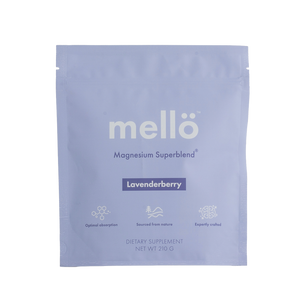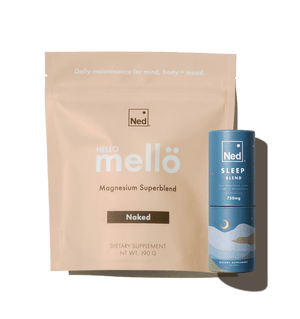ARE YOU MAGNESIUM DEFICIENT?
Studies estimate that only a quarter of Americans are consuming the recommended daily intake, suggesting that as many as 75% of women are not getting enough to meet their body’s widespread magnesium needs.
Do Women Benefit from Magnesium Supplements?
Estrogen Synthesis & Excretion | Energy Production | Bone Density | Calm Stress Response | Blood Sugar Balance | Why mellö is the Best
Magnesium benefits for women include the more than 600 enzymatic reactions that magnesium is needed for and the important processes these reactions make possible [1].
Magnesium enables such functions as estrogen synthesis and excretion, energy production, bone growth, calm stress response, blood sugar balance, and every other major process in a woman’s body.
Unsurprisingly, research evidence supports magnesium’s critical role in the prevention and treatment of many conditions relevant to women’s health [2].
Yet studies estimate that only a quarter of Americans are consuming the recommended daily intake, suggesting that as many as 75% of women are not getting enough to meet their body’s widespread magnesium needs [3].
The National Institute of Health recommends that adult women consume 310-320 mg of magnesium per day. However, metabolic data demonstrates that intakes below 6 mg per kg per day (i.e. below 354 mg/day for a 130 lb woman) are likely to result in a negative magnesium balance.
Consequently, researchers recommend that women consume between 7 and 10 mg per kg of magnesium daily to meet the demands of their bodies [4].
Exercise, stress, heavy thinking, launching immune defenses, alcohol and coffee consumption as well as high intakes of protein, calcium and vitamin D all impede magnesium retention or increase the requirement of magnesium.
Alcohol, for instance, one of the main causes of magnesium loss from several tissues, increases urinary magnesium excretion by 2-3 fold [5].
Read on to learn the benefits of magnesium for women and why mellö Magnesium Superblend is the best supplement for supporting women’s health.
mellö Magnesium
30 serving pouch
Magnesium plays a role in over 300 essential functions in the body, including helping to maintain healthy energy levels, muscle function, and a balanced mood. mellö Magnesium Superblend® is a thoughtfully crafted formula made to support your daily wellness routine.
60-day Stress Free Guarantee
Simply place your order. Your 60-day trial begins from the day your order is delivered.
Start using your Ned product. Our Customer Happiness Team is here to give you all the guidance you need.
If you want to break things off, no hard feelings. Contact our Customer Happiness Team and they’ll help you out. Simple.
**Valid for one product at a time - bundles not eligible
Magnesium Enables Estrogen Synthesis and Excretion
Magnesium is essential to maintaining balanced sex hormone levels in the female body. Not only is it needed for processes that enable estrogen, progesterone, and testosterone production, but it is also critical to Phase 2 detoxification of estrogen in the liver, a process that prevents harmful estrogen dominance [6].
Too much estrogen in comparison to progesterone is known as estrogen dominance. Too much estrogen can lead to poor sleep, PMS symptoms, headaches, fatigue, weight gain, anxiety, fluid retention, and PCOS, as well as contribute to the development of cancers of the breasts and ovaries [7].
Magnesium allows the body to metabolize and remove estrogen, which like many hormones goes through three phases of detoxification so it can be eliminated safely.
In Phase 1 of detoxification, estrogen is turned into three different kinds of metabolites and prepared for elimination in the liver.
In Phase 2, magnesium acts as a cofactor or activator for the COMT enzyme which neutralizes the estrogen metabolites from Phase 1 and makes them water-soluble so they can be eliminated via urine or feces.
Fast elimination of estrogen is important because estrogen that is on the way out of the body can get derailed by the enzyme B-glucuronidase, which leads it to re-enter circulation.
When estrogen levels are high and magnesium intake is suboptimal, estrogen-induced lowering of blood magnesium can increase the calcium/magnesium ratio, resulting in a heightened risk of blood clots [8].
Magnesium Enables Energy Production
Magnesium is a cofactor or activator for enzymes that produce produce energy. These enzymes convert inputs like glucose sugars into adenosine triphosphate, or ATP, the body’s base form of cellular energy.
ATP molecules store and shuttle energy. When cells need to perform actions that require energy such as cell division or moving molecules across their membranes they use ATP bound to a magnesium ion to fuel the process. When it is used ATP turns into adenosine diphosphate or ADP.
ADP is recycled back into the cell’s mitochondria to be recharged and turned back into ATP. An average ATP molecule in a woman’s body goes through this process thousands of times daily.
Because the process that recycles ADP and recharges ATP is magnesium-dependent it requires a continuous stream of magnesium to occur [9].
Magnesium Enables Bone Density
Magnesium is one of the most vital, yet underappreciated bone-building nutrients in a woman’s body. About 60% of total magnesium is stored in the skeletal system where it affects bones directly via crystal structure and cells as well indirectly by impacting various pathways related to bone health [10].
Studies have demonstrated that magnesium intake is linked to bone density whereas magnesium deficiency is linked to osteoporosis, suggesting that low levels of magnesium have adverse effects on skeletal metabolism [11][12].
Magnesium is thus critical for reducing bone fracture risk as women age and research shows that higher intakes are associated with lower bone fracture rates.
One study of individuals 60 years and older, which found that only 27% of participants met the recommended daily magnesium intake at baseline, showed that following 8 years in the study women with the highest magnesium intakes had 62% fewer bone fracture occurrences compared to their lower intake counterparts [13].
Magnesium Enables Calm Stress Response
As a result of magnesium’s intricate involvement in the stress response, deficiency is associated with increased anxiety and stress symptomatology.
Evidence demonstrates that magnesium intake can positively affect feelings of anxiety and may be helpful for individuals who suffer from it.
Unlike its cousin, calcium, which is excitatory, magnesium is inhibitory and acts as a calming agent that helps to reduce excess activity in the Hypothalamic-Pituitary-Adrenal (HPA) axis leading to decreases in the experience of anxiety and the ability to stay calmer under stress.
A 2017 research review of studies examining the link between magnesium and anxiety studies found that magnesium can act as an anxiolytic or have anti-anxiety effects in doses of 75 mg to 300 mg.
The review also found that anxiety and acute stress are linked to increases in both plasma levels of magnesium and its urinary excretion, suggesting that stressful experiences use up more of the body’s magnesium than states of calm [14].
Magnesium Enables Blood Sugar Balance
Research shows that magnesium plays an important role in glucose, or blood sugar control as well as regulation of insulin, which helps explain why magnesium deficiency often leads to intense sugar cravings, especially for chocolate which contains magnesium [15].
Low magnesium levels have been linked to insulin resistance and magnesium deficiency has been observed with both type 1 and type 2 diabetes.
While it remains unclear whether low magnesium is a cause or a consequence of diabetes, studies support that magnesium supplementation can help improve diabetes control by boosting blood magnesium levels [15].
According to the National Institute of Health, when people with poorly controlled diabetes supplemented their dietary magnesium intake with 1,000 mg of magnesium per day for 30 days, they showed improvements in glycemic control.
Why mellö is the Best Magnesium Supplement for Women
mellö is a specially formulated proprietary Superblend of three highly bioavailable forms of chelated magnesium: Aquamin magnesium citrate, magnesium lactate gluconate, and Magtein magnesium L-threonate, plus amino acids L-theanine, GABA, and over 70 trace minerals.
Try mellö today to propel your cognitive function, healthy hormone production, muscle health, memory, mood, immunity, deeper sleep, increased energy, nerve, and muscle health, and every other process in your body.
References
- De Baaij, J. H., Hoenderop, J. G., & Bindels, R. J. (2015). Magnesium in man: implications for health and disease. Physiological reviews.
- Parazzini, F., Di Martino, M., & Pellegrino, P. (2017). Magnesium in the gynecological practice: a literature review. Magnesium research, 30(1), 1-7.
- Bailey, R. L., Dodd, K. W., Goldman, J. A., Gahche, J. J., Dwyer, J. T., Moshfegh, A. J., … & Picciano, M. F. (2010). Estimation of total usual calcium and vitamin D intakes in the United States. The Journal of nutrition, 140(4), 817-822.
- Seelig, M. S. (1964). The requirement of magnesium by the normal adult: summary and analysis of published data. The American journal of clinical nutrition, 14(6), 342-390.
- Romani, A. M. (2008). Magnesium homeostasis and alcohol consumption. Magnesium research, 21(4), 197-204.
- Sparta, M., & Alexandrova, A. N. (2012). How metal substitution affects the enzymatic activity of catechol-O-methyltransferase.
- Fugh-Berman, A., & Bythrow, J. (2007). Bioidentical hormones for menopausal hormone therapy: variation on a theme. Journal of general internal medicine, 22(7), 1030-1034.
- Seelig, M. S. (1993). Interrelationship of magnesium and estrogen in cardiovascular and bone disorders, eclampsia, migraine and premenstrual syndrome. Journal of the American College of Nutrition, 12(4), 442-458.
- Apell, H. J., Hitzler, T., & Schreiber, G. (2017). Modulation of the Na, K-ATPase by magnesium ions. Biochemistry, 56(7), 1005-1016.
- Cohen, L., & Kitzes, R. (1981). Infrared spectroscopy and magnesium content of bone mineral in osteoporotic women. Israel journal of medical sciences, 17(12), 1123-1125.
- Castiglioni, S., Cazzaniga, A., Albisetti, W., & Maier, J. A. (2013). Magnesium and osteoporosis: current state of knowledge and future research directions. Nutrients, 5(8), 3022–3033.
- Rude, Robert K., Frederick R. Singer, and Helen E. Gruber. “Skeletal and hormonal effects of magnesium deficiency.” Journal of the American College of Nutrition 28.2 (2009): 131-141.
- Veronese, N., Stubbs, B., Koyanagi, A., Hébert, J. R., Cooper, C., Caruso, M. G., … & Shivappa, N. (2018). Pro-inflammatory dietary pattern is associated with fractures in women: an eight-year longitudinal cohort study. Osteoporosis International, 29(1), 143-151.
- Boyle, N. B., Lawton, C., & Dye, L. (2017). The effects of magnesium supplementation on subjective anxiety and stress—a systematic review. Nutrients, 9(5), 429.
- Mishra, S., Padmanaban, P., Deepti, G. N., Sarkar, G., Sumathi, S., & Toora, B. D. (2012). Serum magnesium and dyslipidemia in type-2 diabetes mellitus.
mellö Magnesium
30 serving pouch
Magnesium plays a role in over 300 essential functions in the body, including helping to maintain healthy energy levels, muscle function, and a balanced mood. mellö Magnesium Superblend® is a thoughtfully crafted formula made to support your daily wellness routine.
60-day Stress Free Guarantee
Simply place your order. Your 60-day trial begins from the day your order is delivered.
Start using your Ned product. Our Customer Happiness Team is here to give you all the guidance you need.
If you want to break things off, no hard feelings. Contact our Customer Happiness Team and they’ll help you out. Simple.
**Valid for one product at a time - bundles not eligible
Shuteye Chai - mellö Sleep Latte
30 serving pouch
60-day Stress Free Guarantee
Simply place your order. Your 60-day trial begins from the day your order is delivered.
Start using your Ned product. Our Customer Happiness Team is here to give you all the guidance you need.
If you want to break things off, no hard feelings. Contact our Customer Happiness Team and they’ll help you out. Simple.
**Valid for one product at a time - bundles not eligible
The Dream Set
This bundle is literally the Ned dream team! Mellö promotes calm and relaxation to help you fall asleep faster, while Sleep Blend reduces sleep disturbances to help you sleep deeper and longer.
Why it's special:
Two of our best-selling products to help you put sleep problems to rest, once and for all! Mellö promotes calm for a good night’s sleep. Sleep Blend helps you sleep deeper and longer. Limited time offer: subscribe to The Dream Set and we'll add a free gift plus free shipping.
60-day Stress Free Guarantee
Simply place your order. Your 60-day trial begins from the day your order is delivered.
Start using your Ned product. Our Customer Happiness Team is here to give you all the guidance you need.
If you want to break things off, no hard feelings. Contact our Customer Happiness Team and they’ll help you out. Simple.
**Valid for one product at a time - bundles not eligible








